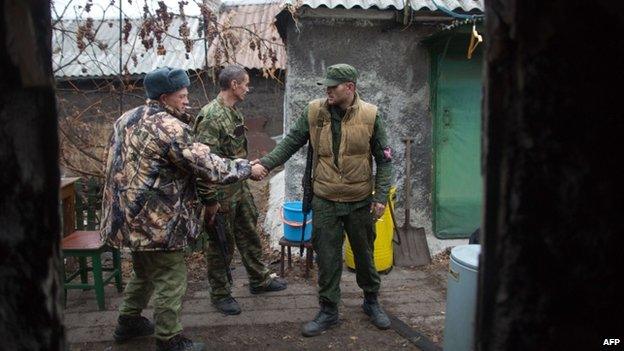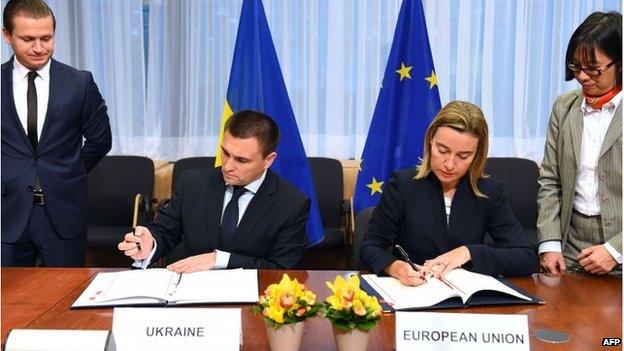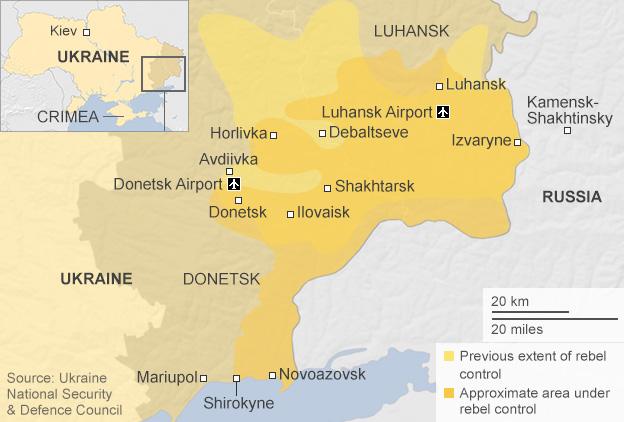Ukraine: EU fails to agree on new Russia sanctions
- Published
EU foreign policy chief Federica Mogherini said Russia was "part of the problem and part of the solution"
The EU's foreign ministers have agreed to move towards placing more Ukrainian separatists under sanctions but not to increase sanctions on Russia, despite concern over escalating violence.
The decision comes a day after pro-Russian rebels in the east reportedly killed at least nine members of the Ukrainian security forces.
EU governments are deeply divided about taking action against Russia.
More than 4,000 people have died in the Ukraine conflict so far.
Six soldiers and three policemen were killed over a period of 24 hours in eastern Ukraine, according to government officials.
Separatists have been fighting government forces since April in the Donetsk and Luhansk regions, in a war that has driven hundreds of thousands of people from their homes.
A ceasefire has been in place since the outlines of a deal were agreed in September, but it has been broken regularly.
Ukrainian appeal
EU ministers met in Brussels to discuss increasing sanctions against pro-Moscow separatists and on Russian officials.
Ukrainian Foreign Minister Pavlo Klimkin made the case for increasing sanctions at the meeting: "We need a real deterrent here in the sense of sanctions and in the sense of propping up and strengthening military capability.

Parts of the Donetsk and Luhansk regions are under rebel control
"We are frightened, in the east of Ukraine, not only for Donetsk and Luhansk and not only for Ukraine, but also for the safety and security of the European Union."
Around 120 Ukrainian and Russian officials are already under EU asset freezes and travel bans.
EU foreign ministers asked officials to put forward names of pro-Russian separatists to be added to the EU's sanctions list by the end of the month.
The council also called for "a halt to the continuous violations of the ceasefire" and "a withdrawal of all illegal and foreign forces," in a statement released on Monday, external.
There was no agreement on how to respond to Russia's actions in Ukraine.
EU sanctions were first imposed when Russia annexed Ukraine's region of Crimea in March following a controversial referendum.
Further measures have been added since, targeting senior Russian officials as well as the country's oil industry, defence firms and banks.
They followed allegations that Russia was sending its soldiers to fight with separatist rebels in eastern Ukraine - as well as weapons for the rebels. The Kremlin denies the allegations.
Western stance
Russia's President Vladimir Putin was criticised by Western leaders at the G20 summit in Australia.
Mr Putin told German TV station ARD that both sides in Ukraine were to blame.
In his interview, Mr Putin said that "anyone waging a fight that they believe fair will find weapons".
He said he believed there was a way out of the crisis, but Russia feared "a drift towards neo-Nazism" in Ukraine.
"It's a great nation with great people," he told the prime-time audience on Sunday.
"But, you know, there's just one thing missing: an understanding that to be successful, stable and grow, everyone needs to have a feeling that this is their home no matter what language they speak - whether it's Hungarian, Russian, Ukrainian or Polish."

An agreement signed in Brussels on Monday paves the way an EU mission to begin on 1 December in Ukraine
Speaking ahead of the meeting of the EU ministers, Ms Mogherini said sanctions would not work unless Ukraine reforms moved ahead.
She said the EU would start a mission to assist the Ukrainian authorities "on restructuring the civilian security of the country".
At the G20 meeting in Brisbane, US President Barack Obama met European leaders to discuss a co-ordinated response to Russia.
Mr Obama told reporters Mr Putin was "violating international law, providing heavy arms to the separatists in Ukraine" and violating the Minsk agreement.
He said the "economic isolation" of Russia would continue unless Mr Putin changed course.
On Saturday, Ukraine's president ordered the withdrawal of all state services, including funding for hospitals and schools, from rebel-held areas in the Donetsk and Luhansk regions within a week.
President Petro Poroshenko issued a decree, external (in Ukrainian) that also asks parliament to revoke a law granting self-rule to the Donetsk and Luhansk regions.
Pro-Russian separatists held elections there last month which Western countries and Ukraine condemned as illegal.


Minsk memorandum on ceasefire: Key points
To pull heavy weaponry 15km by each side from the line of contact, creating a 30km security zone
To ban offensive operations
To ban flights by combat aircraft over the security zone
To set up an OSCE monitoring mission
To withdraw all foreign mercenaries from the conflict zone